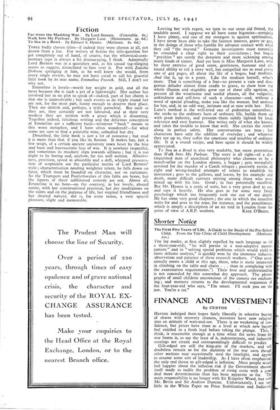Fiction
THREE badly chosen titles—if indeed they were chosen at all, not drawn from a hat. For writers of fiction the title-question has got completely out of hand, of course, but the whimsical-com- mentary type is always a bit discouraging, I think. Admittedly Lord Berners was in a quandary and, as his casual tag-slinging seems to suggest, disinclined to fuss over it. For with Zuleika Dobson springing at him, as he well knew she would, from every single review, he may not have cared to call his graceful little book by its true name, Emmeline Pocock. Still, I don't see why not.
Emmeline is lovely—worth her weight in gold, and all the more because she is such a pet of a lightweight. Her author has involved her in no plot to speak of—indeed, part of her charm is that she is uninvolvable ; but such events as do ripple round her are not, for the most part, funny enough to deserve their place. They are skittish and, perhaps, a trifle parochial. But such as they are, they certainly are not laboured, and at their very weakest they are written with a grace which is disarming. Together indeed, felicitous writing and the delicious conception of Emmeline are a sufficient bush—whatever " bush " means in this worn metaphor, and I have often wondered?—for what some are sure to find a palatable wine, unbodied but dry.
Described, the little book is just a lot of nonsense ; but read it is more than that, if you like its flavour. It makes hay, just a few wisps, of a certain ancient university town beset by the bite and buzz and bureaucratic fuss of war. It is nowhere respectful, and sometimes its mockery slips towards silliness ; but it is too slight to be boring and, anyhow, far too well written. Allusive- ness, precision, speed in absurdity and a deft, whipped presenta- tion of scepticism are the particular merits of Lord Berners' style ; characterisation needing weightier talent, he falls down on farce, which must be founded on character, nor on caricature. So the Trumpers and Postlethwaites of this fable are bores, but the figures of sheer sublimated comedy are not. Above all, Emmeline is no bore—on the contrary, in her lovely, absurd
sanity, with her conversational precision, her dry meditations on the saints and on the purpose of life, her virginal friendliness and her shrewd naiveté, she is, for some tastes, a very special pleasure, slight and memorable. Leaving her with regret, we turn to our stout old friend, the readable novel. I suppose we all have some bigotries—certainly I have plenty, and one of my strongest is against spintualism. I have never been able to take the faintest interest, grave or gay, in the doings of those who fumble for advance contact with what they call "the beyond." Genuine investigators must naturally be conceded a clear right to their convictions ; but bogus " psychics " are surely the dreariest and most sickening among many kinds of sinner. And yet here is Miss Margaret Lane, who by sheer exercise of good sense, gentleness, humour and all- round ability to tell a story well, has compelled me to read .every one of 412 pages, all about the life of a bogus, bad medium. And like it, up to a point. Like the medium herself, what's more. That is something of a feat—to present a vain and dan- gerous deluder almost from cradle to grave, to show how the whole illusion and stupidity grew out of sheer silly egotism, to present all the wearisome and sordid phases, all the vulgarity, unkindness and self-love of such a character—and, without a word of special pleading, make you like the woman, feel anxious for her, and, in an odd way, intimate and at ease with her. Miss Lane's method is the well-tried one of pedestrian naturalism ; she sticks to the ordinary facts of ordinary life, builds them up with great industry, and presents •them subtly lighted by large tolerance and easy humour. She writes only of what she knows, and takes the trouble to know that well. She carries the reader along in perfect safety. Her conversations are true ; her characters have only the oddities of everyday ; and whatever they are up to, they suffer the emotions and troubles of ordinary life. It is a sound recipe, and here again it should be widely appreciated.
To Sea in a Bowl is also very readable, but more pretentious than Walk Into My Parlour. The story is all right—of a dis- tinguished man of anarchical philosophy who chooses to be a match-seller on the London streets, a beggar ; gets wrongfully arrested for the murder of a Czech refugee ; passively resists all right and wrong-headed attempts of others to establish his innocence ; goes to the gallows, and leaves, by his example and death, many difficult currents stirring among those who were mixed up with his fate. Good ; in fact potentially excellent. But Mr. Hyams is a cynic of sorts, has a very great deal to say, and says it heavily. He also goes in for some very fancy psychology which too frequently took me out of my depth. He has some very good chapters ; the one in which the anarchist waits for and goes to the rope, for instance, and the penultimate, which is simply a description of an air raid in London from the


























 Previous page
Previous page